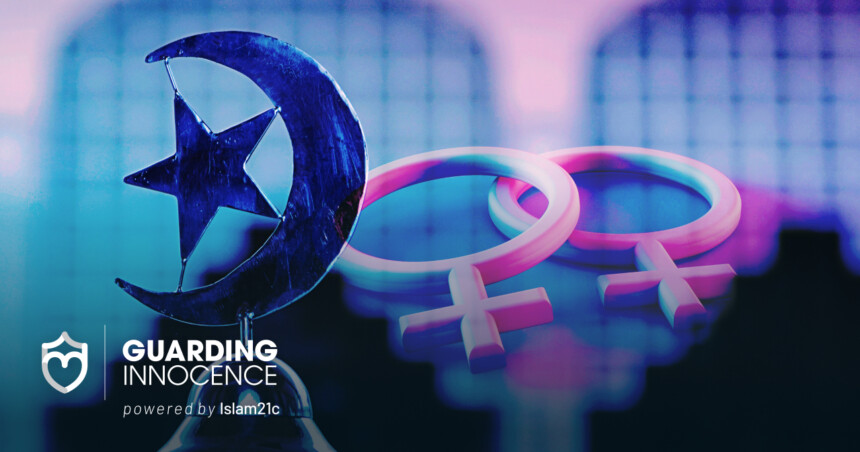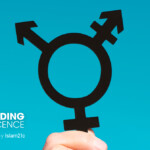Western sexual identity
We need to start by understanding, what is “gay”?
The first use of the term “homosexual” is attributed to Karl Maria Kertbeny in 1868, challenging a Prussian law against gay relationships. Karl was a self-described human rights campaigner, whose diaries listed sexual encounters with youth and men. [1]
As well as inventing the term “homosexuality”, he also invented the term “heterosexuality” and two forgotten words:
- “monosexual” to describe masturbation
- “heterogenit” to describe bestiality. [1]
Karl Heinrich Ulrich (1825-95) — a lawyer considered a pioneer for “sexology” — wrote extensively about same-sex love as an inborn trait and coined the idea of “urning” (a third sex).
Kertbeny, in a letter to Ulrich in 1868, used the term homosexuality, and from the 1870s the concept of a sexual identity began to be widely discussed.
Richard von Krafft-Ebing (1840–1902) popularised Kertbeny’s terms in his influential medical text Psychopathia Sexualis. Thereafter, in the late 19th century, Havelock Ellis and Magnus Hirschfeld advocated for decriminalisation of same-sex acts and challenged Freud’s views on sexual inversion. They proposed that homosexuality had a genetic origin, advocating for the inborn nature of sexual instinct.
This led to early 20th century psychiatry and psychology reframing sexuality as a trait and not just behaviour, with the likes of Kinsey seeing it as a spectrum, paving the way for identity-based understanding, where sexuality is who you are and not what you do.
In today’s world, the phrase “sexual orientation” is widely perceived by health bodies to be something people are born with. [2] Sexual attraction, behaviour, and identity are distinct concepts but are sometimes erroneously simplified as pertaining to one consistent sexual orientation. For example, someone who identifies as gay is perceived to only be attracted to the same sex and only engages in same-sex behaviour, conflating attraction, behaviour, and identity into one.
Islamic presentation on same-sex acts
Now that we realise the modern day perception of sexual identity, what does Islam say? Is there a concept of sexual identity in Islam?
When talking about same-sex acts, the Qur’ān uses the word shahwa to describe sexual attraction:
Indeed, you approach men with shahwatan (desire) instead of women. Rather, you are a transgressing people.” [3]
Interestingly, the singular noun shahwatan (with desire/lust) is used twice in the Qur’ān to only describe same-sex acts, alluding to the fact that same-sex acts are more often experienced in a lustful, carnal setting. [4]
The plural noun al-Shahawāt is used in the Qur’ān thrice to denote other desires.
Beautified for people is the love of al-Shahawāt [that which they desire] — of women and sons, heaped-up sums of gold and silver, fine branded horses, and cattle and tilled land. That is the enjoyment of worldly life, but Allah has with Him the best return.” [5]
Allah wants to accept your repentance, but those who follow al-Shahawāt [their passions] want you to digress [into] a great deviation.” [6]
But there came after them successors who neglected prayer and pursued al-Shahawāt [desires]; so they are going to meet evil.” [7]
Notice how opposite-sex attraction here is also considered as part of shahwa, along with other worldly desires. This suggests that same-sex or opposite-sex desires are viewed in the same lens of sexual desires and not as distinct inherent identities. The desires on their own are not sinful, it is only if hearts follow and act upon them with intention.
Allah does not impose blame upon you for what is unintentional in your oaths, but He imposes blame upon you for what your hearts have earned. And Allah is Forgiving and Forbearing.” [8]
There is no sin upon you for that in which you err, but only for what your hearts intended.” [9]
Allah does not impose blame for desires that are unintentional, echoing the reality that sexual attraction is involuntary and not a choice. Hence, Islam only denounces behaviours or same-sex acts, which in hadīth may be referred to as liwāt (anal intercourse). These are always seen in the frame of single actions and not an enduring orientation or identity.
Islamic presentation on desires
The Qur’ān also addresses lack of desire, or al-‘Irba.
…or those male attendants having no physical desire, or children who are not yet aware of the private aspects of women…” [10]
Note how the verse talks about a population with an experience, rather than Allah (subḥānahu wa ta’āla) naming this group as “asexual”. The Qur’ān continuously talks of those who act on their desires, without needing to classify them into a homogenous group. Therefore, it insinuates that creation can experience any type of desire or no desire at any point.
While the mere experience of a desire is not sinful, we are asked to guard against acting upon them. The story of temptation between Ādam and Hawa (ʿalayhima al-Salām) and Yusuf’s refusal (ʿalayhi al-Salām) and seeking protection from Allah (subḥānahu wa ta’āla) from the seduction of Zulaykha (the wife of al-Azīz) shows the strength of sexual desires and the need to guard ourselves from desires that are truly intoxicating:
And when they saw him, they greatly admired him and cut their hands and said, ‘Perfect is Allah! This is not a man; this is none but a noble angel.'” [11]
Allah also describes the People of Lūt (ʿalayhi al-Salām) as being blindly intoxicated:
By your life, [O Muhammad], indeed they (People of Lot) were, in their intoxication, wandering blindly.” [12]
Sexual acts are only considered in the concept of a defined relationship, a marriage, only between a man and a woman — anything outside is illicit (zina).
However, there isn’t a concept for a Muslim to exclusively experience opposite-sex attraction as an obligatory precursor to marriage. Muslims may enter marriage with no or varied attraction, and they may learn intimacy within the marriage itself. But it is recommended to discuss these aspects with a prospective spouse before marriage.
Islamic presentation on gender confusion
In addressing gender confusion, Islam acknowledges men who identify more with the opposite sex, where hadīth literature mentions mukhannathūn (effeminate men) [13] and mutarajjilāt (masculine women) [14].
Islam acknowledges this confusion, but also states clear gender roles:
…and the male is not like the female.” [15]
Men are described as protectors and maintainers [16], who stand firm for justice [17], guard prayers and almsgiving [18], are role models to their family [19], united in fighting for what is right [20], have control over their desires [21], restrain their anger [22] fulfil their promises [23], are strong and trustworthy [24], and consult among themselves. [25]
Women are equal before Allah in spiritual devotion [26], exhibit modesty [27], are resilient in adversity [28], nurturing [29], avoid flirtatious speech [30], take counsel [31], and are comforting [32].
Islam on identity
Both men and women have distinct roles, where we identify on the basis of our biological sex, but not our sexual desires or gender identity.
Our identity is intrinsically linked to the relationship with our Creator, in a state of servitude (ubūdiyah) [33], in the pursuit of taqwa [34], and understanding our role as a part of a wider Ummah [35]. Islam promotes an identity which isn’t based on our ancestors [36], or where faith is merely a verbal attestation devoid of sincere actions [37].
The word “Muslim” itself is a verbal noun, meaning anyone who submits to Allah, or has striven to do so in the past. Hence it is an identity based on action and not mere association.
And strive for Allah with the striving due to Him. He has chosen you and has not placed upon you in the religion any difficulty. [It is] the religion of your father, Abraham. He [i.e. Allah] named you ‘Muslims’ before [in former scriptures] and in this [revelation] that the Messenger may be a witness over you and you may be witnesses over the people.” [38]
While Islam promotes unity, it also recognises the diversity of human experience and explicitly calls it out. Diversity is understood within the realm of people and tribes [34], languages and colours [39], colours of people, fruits, animals and mountains [40], diversity in thought [41], and in tests given to us [42].
Western and Islamic concepts compared
Western public discourse tends to frame sexuality in the language of identity, consent, and rights:
- who a person “is”;
- what adult choices they freely make;
- and how law protects that self-definition.
Islamic moral reasoning, by contrast, ethically frames sexuality as acts governed by taqwa (God-centricity), intention, and harm — rather than as enduring identities.
These are not parallel tracks. One system prioritises self-expression under evolving social norms; the other prioritises obedience within divinely fixed limits while acknowledging human variability and struggle.
Superimposing terms like heterosexuality on Islam does great damage, as they imply Islam believes in the concept of defining sexual identities. This would insinuate that believers must only experience opposite-sex attraction to be able to marry. This minimises the concept of relationships to be based mainly on sexual attraction, rather than shared beliefs and values.
The language of Qur’ān and Hadīth consistently speaks in the context of the experiencing sexual desires and acting upon them, rather than suggesting those who experience varying desires need to be named and differentiated.
Acknowledging same-sex desires
The question is not whether Islam “recognises” people’s inner experiences; it does, and it addresses them as desires that ebb, surge, and test us.
Islam acknowledges the reality of temptation and beauty, such as the story of Yusuf (ʿalayhi al-Salām). It recognises the existence of same-sex attraction within the story of Lūt (ʿalayhi al-Salām). Therefore, there is no problem with the reality of a Muslim that experiences same-sex attraction or one who shares that reality to others in the context of receiving support.
Many have confused the Islamic concept of covering sins to mean you forever hide your struggle of sexual desires and don’t approach help. The lines between struggling with an attraction and those proudly ascribing themselves to an LGBTQ identity have blurred. And unfortunately, some Muslims are too ashamed to receive help.
Negativity and shame around just the experience or existence of same-sex attraction has had a huge impact on our communities. When the people of the city came to Lūt (ʿalayhi al-Salām), rejoicing at the news of visitors, he used the words “so do not shame me, and have taqwa, and do not disgrace me”. [43] However, this shame is attributed to the act that they would commit to their guests and not the fact that they experience same-sex desire.
For many, the differentiation between desires and acts isn’t clear. Lūt (ʿalayhi al-Salām) was clear when he addressed the action and not the desire:
Indeed, I am, toward your deed, of those who detest [it], My Lord, save me and my family from [the consequences of] what they do.” [44]
The story of Lūt (ʿalayhi al-Salām) is a reminder for Muslims that same-sex desire is a trial and that Lūt’s call towards taqwa is the answer.
Conclusion
In a Western secular framework, affirmation of any identity is the ethical destination; whereas in the Islamic framework, attractions aren’t seen as identities. Islam focuses on the gender roles of mothers and fathers by placing sexual limits — through marriage, chastity, modesty, and repentance.
Islam does not convert recurrent desire into a permanent legal identity, even as it calls for compassion, privacy, and restraint. Naming this difference makes room for honesty: Muslims can uphold their beliefs without malice. Our refusal to re-code sexual acts as identities is principled, not personal. Disagreement need not become dehumanisation. It can be the ground for living together with clarity — protecting beliefs, protecting the vulnerable, and allowing Muslims to practise faith without being compelled to adopt a moral grammar that is not their own.
While those that might be struggling with same-sex desires may feel there is no way out, or no one to love them, they should not despair in the mercy of Allah (subḥānahu wa ta’āla) and His provision.
And will provide for him from where he does not expect. And whoever relies upon Allah — then He is sufficient for him. Indeed, Allah will accomplish His purpose. Allah has already set for everything a [decreed] extent.” [45]
Source: Islam21c
Notes
[1] https://www.bbc.co.uk/future/article/20170315-the-invention-of-heterosexuality
[2] https://www.bacp.co.uk/media/22810/bacp-gender-sexual-relationship-diversity-gpacp001-mar23.pdf
[3] al-Qur’ān, 7:81
[4] al-Qur’ān, 27:55
[5] al-Qur’ān, 3:14
[6] al-Qur’ān, 4:27
[7] al-Qur’ān, 19:59
[8] al-Qur’ān, 2:225
[9] al-Qur’ān, 33:5
[10] al-Qur’ān, 24:31
[11] al-Qur’ān, 12:31
[12] al-Qur’ān, 15:72
[13] Sahīh Muslim, 2,180; https://sunnah.com/muslim:2180
[14] Sahīh al-Bukhārī, 5,886; https://sunnah.com/bukhari:5886
[15] al-Qur’ān, 3:36
[16] al-Qur’ān, 4:34
[17] al-Qur’ān, 4:135
[18] al-Qur’ān, 24:37
[19] al-Qur’ān, 25:74
[20] al-Qur’ān, 61:4
[21] al-Qur’ān, 24:30
[22] al-Qur’ān, 3:134
[23] al-Qur’ān, 33:23
[24] al-Qur’ān, 28:26
[25] al-Qur’ān, 42:38
[26] al-Qur’ān, 33:35
[27] al-Qur’ān, 24:31
[28] al-Qur’ān, 66:11
[29] al-Qur’ān, 31:14
[30] al-Qur’ān, 33:32
[31] al-Qur’ān, 27:32
[32] al-Qur’ān, 30:21
[33] al-Qur’ān, 51:56
[34] al-Qur’ān, 49:13
[35] al-Qur’ān, 21:92
[36] al-Qur’ān, 2:134
[37] al-Qur’ān, 2:8
[38] al-Qur’ān, 22:78
[39] al-Qur’ān, 30:22
[40] al-Qur’ān, 35:27-28
[41] al-Qur’ān, 11:118-119
[42] al-Qur’ān, 5:48
[43] al-Qur’ān, 15:68-69
[44] al-Qur’ān, 26:168-9
[45] al-Qur’ān, 62:3







